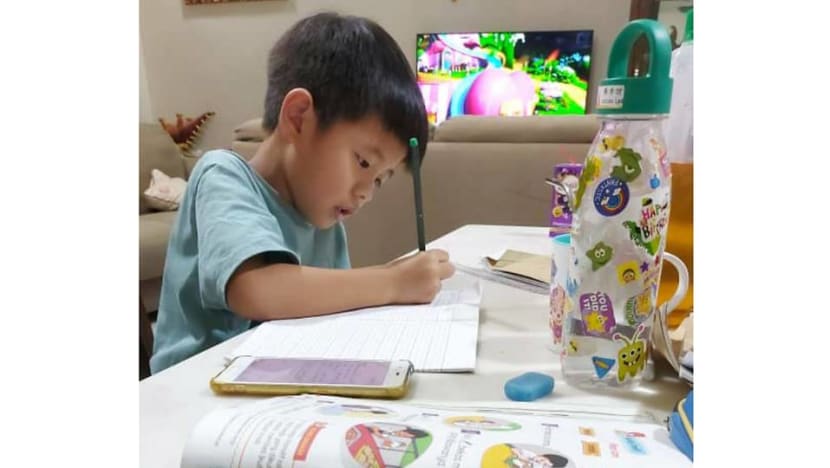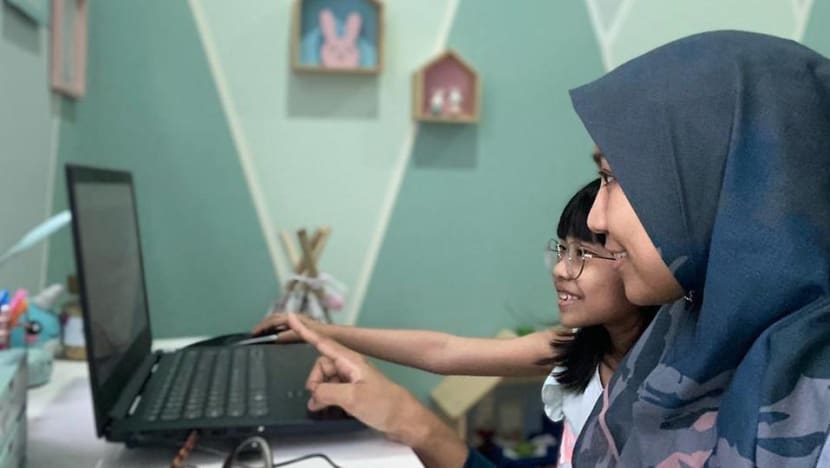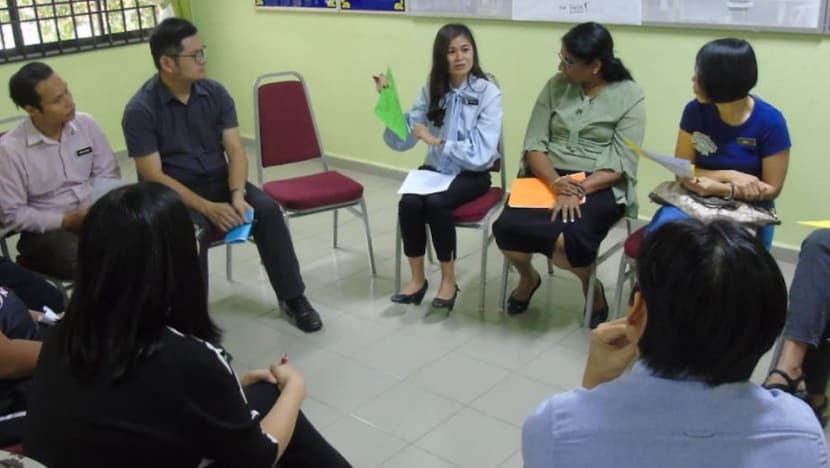Parents in Malaysia fret over academic progress amid prolonged school closure, online learning

Students wearing face shields in the classroom. (File photo: Bernama)
KUALA LUMPUR: With schools in Malaysia returning to home-based teaching and learning again, Jessica Teng is bracing for hectic weeks ahead juggling work and her three children's studies.
The corporate communications manager, who resides in Shah Alam, said each kid has four to five online classes a day, starting from 8am for the older kids in primary school and 9am for the youngest in kindergarten. Each class lasts about an hour.
“I’ll be half-helping my youngest and half-working, because the teacher needs them to interact and I have to encourage him to interact through his tablet,” she added.
Meanwhile, she has to check on her two older kids every 30 or 45 minutes.
“It’s necessary, because my second child has a short attention span. I’ve caught him daydreaming, poking holes into his erasers, breaking pencils or worse, opening a new browser tab to surf YouTube while the teacher is teaching,” Mdm Teng added.
In May, school lessons were moved online for two weeks before the mid-year break, and students will not return to physical schooling for the new term beginning Jun 13 or Jun 14.
Education Minister Mohd Radzi Md Jidin announced on Sunday (Jun 6) that schools would carry out home-based learning for the next 25 schooling days due to the COVID-19 situation.
READ: Home-based learning for new school term in Malaysia, says education minister
Malaysia is currently under a "total lockdown" until Jun 14. Daily COVID-19 cases have breached the 9,000-mark twice, while daily fatalities reached 126 on Jun 2, the highest since the start of the pandemic.
The latest school closure hinted at yet another year of disrupted education, after 2020’s schooling year was upended by the COVID-19 pandemic which saw schools opening for face-to-face learning for just about five to six months.
Students in Malaysia had returned to schools in phases this year, beginning with pre-schoolers as well as Primary 1 and Primary 2 students on Mar 1.

However, there have since been reports of positive cases being detected in educational institutions and affected schools or classes were ordered to close for two days.
Schools in localities that have been put under enhanced movement control order (EMCO) due to a high number of cases were also mandated to close, further reducing the days of in-person schooling.
The same challenges from last year's prolonged school closure resurfaced, including students' access to the Internet and efficiency of home-based learning. Parents are understandably worried about their kids' academic progress, not to mention the lack of social interaction and outdoor activities.
With the enforcement of a total lockdown beginning Jun 1, the daycare centre and pre-school which Mdm Teng usually sends her children to have to close as well.
“We’re feeling mostly frustrated and worried, because it feels like we just can’t win. The schools reopened not too long ago and then they’re closed again,” she said.
READ: IN FOCUS - Prolonged school closure in Malaysia due to COVID-19 shakes up learning experience
ACADEMIC TOLL AND PRESSURE ON PARENTS
Like other parents CNA interviewed, Mdm Nasreen Hani, an engineer, was worried about her daughter's progress. She had earlier pulled her eight-year-old daughter out of physical schooling in April because a positive case was detected in a class next to her daughter’s.
“She’s in Primary 2, but she has yet to master the basics for some subjects, including Bahasa Melayu. She’s also taking Bahasa Arab at school, and we don’t speak or understand the language at home.”
“Can you imagine how parents like me are supposed to help them with their homework? Our teaching method is also different from actual educators. I worry that I’d confuse my kid more than helping her,” she lamented.

Sabahan Leslie Ikon noted that his three nieces, aged 7, 10 and 12, have been affected by school closure, with the lack of stable Internet connection compounding the problem.
At one point, there was no Internet connection for a few weeks in March and April in Telupid, where he and his extended family are living.
“They can’t read properly or construct proper sentences on paper.
“This makes me worried when my eldest son enters primary school next year, because he’s already not the top student in (his pre-school) class even though his mum is the teacher,” he said, adding that his son also has speech problems.
Ms Nasreen said the shutdown was definitely taking a toll on her mental and emotional health.
“As a working mum who also has a business on the side, it feels almost impossible to cope with my daughter’s distance learning activities,” she said.
SCHOOL CLOSURE RESULTS IN LEARNING LOSS
While there was no study at present in Malaysia to identify the amount of lost time students experienced as a result of school closure, education expert Melissa Tanya Gomes said they could be experiencing one year or more immediate learning loss, an estimation based on a World Bank study.
Ms Gomes, who runs Edvolution Enterprise, an education non-profit social enterprise, said the June 2020 study concluded that five months of school closures due to COVID-19 would result in an immediate 0.6 years of schooling.

"During MCO 1.0, schools were closed for four months (from mid-March to June 2020), and closed again for another three months (until schools reopened in March or April this year), a total of seven months.
"This means, Malaysian students are experiencing nearly one year or more of immediate learning loss," she told CNA.
Ms Gomes also pointed out that when schools reopened on Jun 24 last year, a majority of students did not report back to their schools.
In October, the minister had announced that Malaysia's average school attendance was at 85 per cent, meaning the remaining 15 percent of students, approximately 705,000 nationwide, were absent from school.
The issue has surfaced again one week into home-based learning in May, she noted.
"This unending predicament will compound the current learning loss in students," she said.

Ticking off a list of issues from Internet connectivity and affordable learning gadgets to teachers’ competency and educational materials, Mr Mak Chee Kin, who heads the Melaka Action Group for Parents in Education (MAGPIE), said the renewed school closure revealed that the government has not prepared the schools for digitalisation.
The 150,000 laptops promised in Malaysia's 2021 budget to enable schoolchildren to carry out home-based learning have yet to be fully disbursed, he pointed out.
“Regretfully, even this has yet to be fulfilled. If the government can’t provide the budget for all, we propose that any community halls or rooms in public flats, or even the rural or district libraries, be converted into computer resource centres.”
“At least they would help some children who are serious about their studies,” Mr Mak said.
READ: Malaysia to abolish primary school leaving examination from 2021
FOCUS ON MASTERING BASIC CONTENT: MINISTER
In the Sunday press conference, Dr Mohd Radzi, the education minister, explained that the ministry had realigned the curriculum last year and divided the content into three main components - basic, additional and complementary.
Teachers would give emphasis on completing the basic content, he said.
"Upon ensuring that students have mastered the basic content, teachers will then move on to the additional content and then complementary content, if time permits," the minister said.

The education television service “Didik TV” would also continue with 15 hours of broadcasting a day for students facing connectivity problem, Dr Mohd Radzi said. The slot for education programme would also proceed on RTM’s TV Okey for two hours and Astro Tutor TV for four hours every day.
As for the 150,000 laptops under the Cerdik Initiative, a joint effort between the finance and education ministries, the minister said 12,887 laptops had been distributed to B40 (bottom 40 per cent of income distribution) students in 95 schools nationwide.
Another 40,290 devices were expected to be distributed latest by Jun 12, and the remaining 96,823 would be fully distributed by the end of September.

The minister added that the ministry would continue to support students and teachers through counselling.
Students would be able to receive counselling if they were facing difficulties with their schooling experience. The same applied to the teachers, he added.
Further training and courses for teachers would also be increased, especially in the context of home-based learning and teaching skills such as mastering information and communication technology (ICT) and digitalisation, the minister said.
BOOKMARK THIS: Our comprehensive coverage of the COVID-19 pandemic and its developments
Download our app or subscribe to our Telegram channel for the latest updates on the coronavirus outbreak: https://cna.asia/telegram












